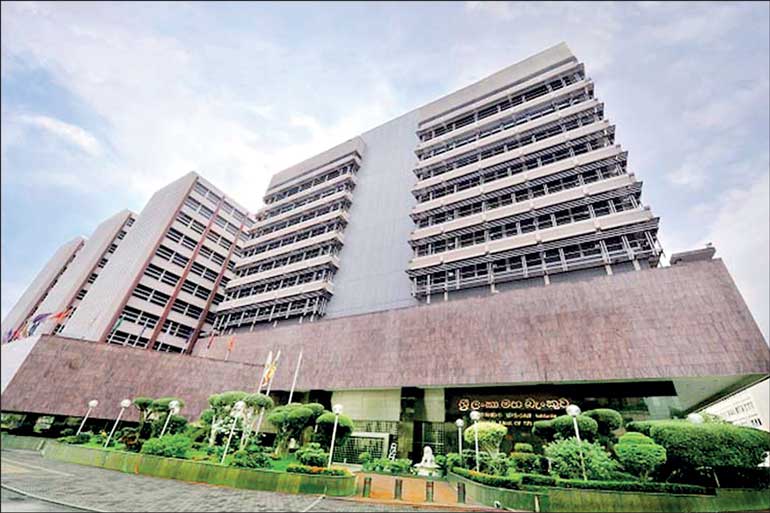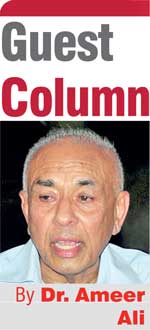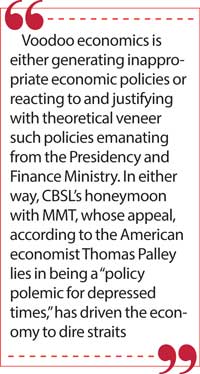Saturday Feb 14, 2026
Saturday Feb 14, 2026
Friday, 1 October 2021 00:00 - - {{hitsCtrl.values.hits}}

A form of voodoo economics is now being propagated from the Central Bank of Sri Lanka. This economics is couched within the theoretical parameters of the so-called Modern Monetary Theory, whose cardinal principle is that governments could and should print as much money as they require to spend because governments do not go bankrupt unless forced by political imperatives
Voodoo economics is a demeaning phrase coined by George H. W. Bush to attack Reaganomics of 1980s, which introduced what came to be known as supply side economics with its infamous Laffer Curve.
introduced what came to be known as supply side economics with its infamous Laffer Curve.
That curve-related government revenue with tax rates and argued that between 0 and 100% tax rates, which bring zero revenue, there will be one rate that would maximise it. On that basis, President Ronald Reagan went on chasing after that magical rate in order to give greater incentives to private enterprise and the market. Hence, the term supply side economics as opposed to the then reigning demand-oriented Keynesian economics.
To back up the theoretical foundation of his argument, Reagan was reported to have paraphrased what Ibn Khaldun, the greatest 14th century Tunisian Muslim historian and sociologist, wrote in his path-breaking Kitab al-ibar, a four-volume universal history, and Muqaddimah, the prolegomena, where Khaldun observed that “at the beginning of the dynasty great tax revenues were gained from small assessments and at the end of the dynasty small tax revenues were gained from large assessments”.
Supply side economics became the harbinger of the destruction of welfare states and set the pace for the growth of turbo capitalism with all its ugly features and consequences. The rest is history and irrelevant to what follows.
A somewhat different form of voodoo economics is now being propagated from the Central Bank of Sri Lanka (CBSL). This economics is couched within the theoretical parameters of the so-called Modern Monetary Theory (MMT), whose cardinal principle is that governments could and should print as much money as they require to spend because governments do not go bankrupt unless forced by political imperatives.
This implies that too much money does not create inflation even if they chase too few goods as economists believe. To the former CBSL Governor, Professor W.D. Lakshman, and his current successor, Nivard Cabraal, MMT provided the theoretical rescue for their callous decision to allow the printing machine work overtime to keep on providing liquidity to a beleaguered economy. Apart from denying the inflationary effect of their action, Cabraal also argued that inflation does not depreciate currency.
on providing liquidity to a beleaguered economy. Apart from denying the inflationary effect of their action, Cabraal also argued that inflation does not depreciate currency.
Not surprisingly and to justify this voodoo economics, CBSL calculated headline inflation rate without including food prices, which is now consuming the greatest share of income in millions of ordinary households. Food inflation was kept separate and called it simply a “worry”. Once the rate of inflation is artificially reduced another theoretical device, the national income deflator, which is relevant to calculate economic growth also becomes faulty. With these massaged statistics, Cabraal is now feeling upbeat about an 8% growth rate for the first half of 2021, and claims that the economy is not in recession.
Similarly, on rupee depreciation also, CBSL’s recommended exchange rate was far below the prevailing market rates, and it was because of CBSL’s failure to bring the market in alignment that Lakshman desperately resorted to moral suasion and appealed to monetary institutions to become patriotic. The Professor of Economics should have known better that ethics and morals have nothing to do with market rationality. Cabraal now complains that exporters have hoarded $ 2.76 billion without repatriating their profits. They are only acting rationally to enhance their profit when the rupee is destined to depreciate further.
Voodoo economics is either generating inappropriate economic policies or reacting to and justifying with theoretical veneer such policies emanating from the Presidency and Finance Ministry. In either way, CBSL’s honeymoon with MMT, whose appeal, according to the American economist Thomas Palley lies in being a “policy polemic for depressed times,” has driven the economy to dire straits.
A vainglorious Cabraal, who is not an economist but an accountant and appointed politically to head CBSL for another term, still believes that “home-grown workable solutions” would pull the economy out of its doldrums and realise the so-called vistas of plenty and prosperity enunciated by President GR. One should not forget that it was during the previous era of Cabraal as CBSL Governor that the premier institution incurred a loss of 10 billion rupees.
Contrary to Cabraal and his political masters, there is rising consensus among economists that Sri Lanka has no alternative but to go to IMF for assistance. In their view IMF is the last resort although it is not a panacea for all economic woes. That world institution backs private enterprise and the market economy, but it would insist that the market should be cleaned up first to remove existing rigidities, and that the Government needs to adopt measures to increase revenue and cut down wasteful expenditures and close the yawning budget deficit gap. In other words, IMF assistance would come with conditions that involve structural changes, and indirectly, changes in foreign policy.
This is where problems arise to the Rajapaksa regime, which has allowed mafia-imposed rigidities to rule the market, and those mafias act hand-in-glove with corrupt Government politicians. Thus, with a pro-China tilt in foreign policy, going to IMF would not be politically palatable.
On the other hand, Cabraal’s home grown solutions, which hinge on (a) continued financial borrowing from friendly neighbours to settle the bourgeoning debt and to fund public expenditure, (b) arbitrarily chosen measures to adopt an import substitution strategy, and (c) printing more money. This would not work because, the first would imply that lenders, even if they be friends, would be ignoring against all odds the warning by reputable credit rating agencies about Sri Lanka’s increasing credit risk; the second would eventually decrease exports which would be detrimental to recovery; and the third would depreciate the rupee further and hyper-inflation would not be an impossibility.
Therefore, the sooner the authorities approach the IMF, the less will be the pain of economic restructuring and postponement would mean greater pain. Cabraal should give up his voodoo economics and talk sense to political masters.
(The writer is attached to the School of Business & Governance, Murdoch University, Western Australia)